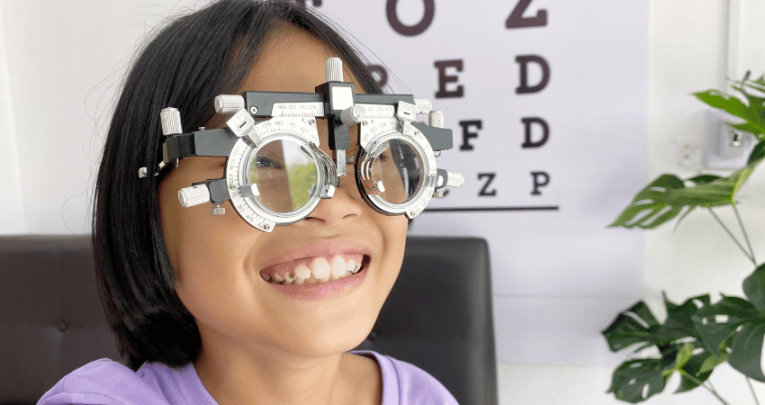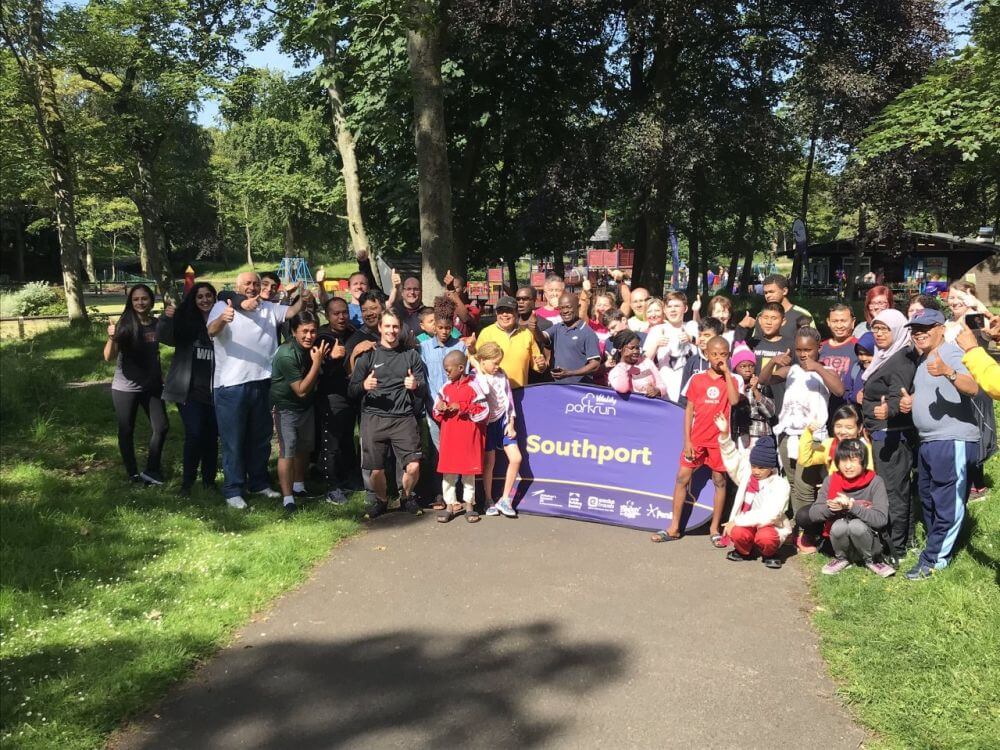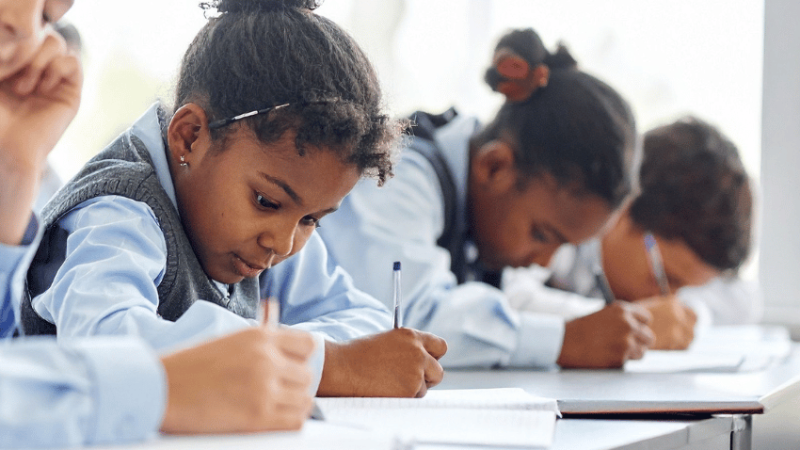Visual impairment support in schools – Advice & case studies

With some preparation and imaginative thinking, your lessons can be as engaging for visually impaired pupils as they are for everyone else…

- by Teachwire
- Classroom expertise and free resources for teachers

We explore practical strategies for providing visual impairment support in schools, with real-life case studies on how to help visually impaired pupils excel in maths and make sports more accessible…
Providing visual impairment support in schools
With some preparation and imaginative thinking, your lessons can be as engaging for visually impaired pupils as they are for everyone else, says Juno Hollyhock…
Should all teaching and learning be inclusive? I’d be very surprised if anyone reading this would answer ‘no’. However, inclusive teaching in a class where all students have broadly equal access to all of their senses is one thing.
Inclusive teaching in a class where one or more children are without a critical sense, such as sight, is quite another.
If we’re to provide visually impaired children with an inclusive learning experience that doesn’t entail parking them with an LSA at the back of the classroom, then we need to plan carefully.
Preparations
Before the child’s first visit to your school, ensure that you know what you’re dealing with.
1. What is the extent of the visual impairment? Total lack of sight is different to tunnel vision. This is different again to being able to perceive light and darkness. Talk to the parents/ carers of the child. Find out as much as you can about the child’s experience of visual impairment.
2. Is the visual impairment acquired or present since birth? This is important. A child confident with moving around in a sighted world since birth will have different experiences and expectations to one coming to terms with an acquired condition.
3. What techniques are already in use at home and in other settings? Ideally it’s best to initially follow existing tools and forms of communication. This is rather than introduce a whole new raft of things to learn just for school. This will help the child settle in faster and access the curriculum more easily.
4. Will full vision return, or is this a lifelong condition? If the visual impairment has been acquired recently and is unlikely to improve, school will be a key place in which to set targets around communication skills, confidence and aspirations going forward. This is in addition to their education targets. Agree these extra targets with the family and the child.
5. What additional support are you putting in place? For example, check whether there will be a dedicated LSA who can help the child with integrating.
Lived experience
You can then begin preparing your staff and pupils. It may be that you decide to give them some lived experience of the visually impaired child’s ‘view’ on the world.
This might involve spending an hour with some form of blindfold that mirrors as closely as possible the nature of the child’s visual impairment. (Such as a full blindfold, netting, old spectacle frames dressed up with cardboard ‘lenses’ that have pinholes, etc).
This can be a great way of identifying some of the challenges he or she might face. You can then build on this by devising scenarios with particular aims in mind, such as the following:
- Helping children and staff to understand what it’s like to be pulled around a space, rather than guided with a hand on the arm
- Experiencing the distraction of non-relevant noises when trying to listen to a lesson – particularly one delivered from the front of the class only
- Finding out how difficult it can be to tell voices apart when people don’t give their names
- Appreciating the importance of tactile resources in giving depth and texture to a learning resource
Impress upon staff and pupils the importance of not making sudden or unannounced changes to the classroom layout. This includes moving tables and chairs or leaving bags around.
Are there any ‘clues’ around the walls or floor surfaces that might help a child with a visual impairment navigate from their desk to the door, from the door to the whiteboard and the whiteboard to the drawers?
Start a ‘buddy’ scheme among your pupils where the person appointed buddy changes each week. This means the child is interacting with a wide range of peers and getting to know new friends.
The child’s first day
Once they’ve arrived, spend some time in the classroom with the child and their Buddy to help them map certain routes and identify non-visual features.
Make sure that you’ve planned routes to areas such the toilets and the playground. Whilst the Buddy is there to help, the child must be able to develop their confidence and sense of independence.
Talk about the child’s seating plan and who they’ll be sitting with. Explain if and how that seating plan may change.
Teaching and learning
High-quality teaching and learning for a child with a visual impairment looks very similar to high quality teaching and learning across the board:
- Share and understand targets
- Behaviour management is strong
- Use questioning effectively to test learning outcomes
- Resources are creative, of high quality and where possible, multi-sensory
As always, behaviour management should be fair and equitable across the board. However, take care with sanctions or restorative measures to ensure that they’re achievable and fair for the visually impaired child.
All learners will enjoy using resources that are multi-sensory. There’s a wide range of such resources on the market.
With a little ingenuity you can convert a visually based lesson to one that uses sounds, touch and taste and even smell to help communicate messages and learning points.
Musical notes or sounds are a great way to communicate with a class. Sound can be used to describe many things, from running water to farm animals, and even colours, with a little imagination.
Combining sounds and words together will stretch children’s imagination at story time and in creative writing endeavours.
Pictures can be enhanced with use of texture and loose parts. Stories can be told by preparing a bag of materials illustrating certain parts of the story and pouring them into the hand at the right time.
The biblical parable of the sowing of the seeds is excellent for this. Stones, seeds, earth, water and warmth can all play a sensory part.
Movement is another good way of embedding learning for the whole class. Different movements for different numbers in maths, for example, can create a fun method of learning that embeds numeracy confidence whether you’re sighted or not.
Outside the classroom
All children benefit from feedback to parents and carers. This is especially important for a visually impaired child if they’re to thrive within the classroom and successfully complete homework tasks.
- Share any learning or communication techniques you’ve found to be particularly helpful
- Share homework tasks and ensure that parents/ carers understand how they can provide support with these without over-supporting
- Provide any additional tactile resources that might be needed for homework
- Establish contact with any other settings the child attends. This ensures that progress is matched across all aspects of their life, where possible
- Make space for regular contact with the family, even if from your point of view there’s nothing specific to discuss
Juno Hollyhock is CEO of The Rose Road Association – a registered charity that provides support services for children and adults with complex and multiple disabilities and health needs.
Case study: Supporting visually impaired pupils in maths

Tackling maths can be tricky at the best of times. But how do you adjust provision to cater for a pupil with visual impairment? Olivia’s story shows it can be done, and done well…
When I was told that my new mixed Year 3/4 class would include a child who is registered blind, I had many questions going through my head.
But my biggest question was around maths. As a school, our KS2 maths planning is very visual, especially in the younger years. Where would I start? What would I need to do differently?
Recognition of prior learning
As Olivia (not their real name) was new to school and had limited prior maths teaching, it was essential to establish the right starting point.
Based on my knowledge of the maths progression that we follow, I carried out my own assessments with Olivia.
I found the best place to start would be from the foundations developed in EYFS. First we’d need to focus on building understanding of the number system and the value of numbers.
Advice from our local council’s Visual Impairment Team identified that repetition is key to securing learning.
A child who has a visual impairment needs more repetition. This is because they do not have visual aids to refer to around the classroom.
However, I knew that if I had to teach the same maths lesson every day each week, I would get bored of it (let alone how Olivia might feel!). Therefore we developed a rolling timetable.
We created a carousel of activities that we would repeat each week. It looked a bit like this:
Monday: Number bonds to 10; regrouping
Tuesday: Measuring and comparing length (longer, shorter, taller)
Wednesday: Part-whole addition
Thursday: Exploring properties of shapes
Friday: Recording answers on braille note touch
Every half term, four of these activities changed. However, we felt it was necessary to keep the number and place value activities constant to secure key learning.
Adaptive teaching
We came across several challenges in supporting Olivia’s understanding of the number system.
Firstly, when sighted people use their fingers or objects to learn how to count, they can physically see the amount is increasing.
However, for someone who is visually impaired, they do not have the same recognition.
We tried many ways to support counting and found that concrete resources were the most beneficial.
However, every time Olivia placed one down, she would not find it again on the table.
So, rather than acknowledging she had counted to 10, she may still be at one or two as she could not feel the rest of the objects.
To tackle this, we introduced small, lipped bowls. This reduced the area she was working in so every time she counted one, she placed one block into the bowl.
This way, Olivia had a reduced space to scan to make sure she had not missed any.
We continued to use the bowl method – adding in a second bowl – when learning about addition. For example, we would give Olivia one bowl with five cubes in it, and ask her to add three more.
So as not to count the same cubes twice, she would move the original five counters over to the second bowl, one by one, which she knew already had three cubes in it.
She could then use her existing counting skills to infer that the total – eight cubes – in the second bowl, was the result of adding her original five to the additional three.
Using this method, it did not take long until she was secure with her numbers up to 10 and adding within 10, with a certain amount of independence.
Building efficiency
To reduce reliance on counting and to build efficiency, we knew that it was important to support development of fact recall and particularly number bonds to 10.
To teach this, we used a tactile tens frame. We started off by allowing Olivia time to feel and explore the tens frame so she understood that there were 10 spaces on it.
We used magnetic counters on the tens frame. We’d place a few on and ask Olivia how many more we would need to count to ten.
For this, she had to scan to feel the empty spaces. At the start, she needed a lot of guidance to scan systematically across the tens frame. She was counting the empty spaces twice or missing a few.
To challenge her, we then began to place the counters on the tens frame in a random pattern. She would have to feel for the magnets and then feel for the spaces.
We did have to make sure the magnets were strong. Olivia can be very heavy-handed and at times ended up moving the magnets as she scanned around.
Again, we repeated this weekly for roughly a term and a half. She is now secure on the recall of her number bonds to 10.
Using key questions
One thing I have noticed, is that I’ve had to change the language I use for questioning.
We regularly ask Olivia, “Are you sure?” when she is giving an answer. This is a prompt to remind her to check back and see if she has worked it out correctly.
Unlike most of the class who can see their answer in front of them when using concrete resources, Olivia can’t. She needs to be taught to regularly go back and check she has counted everything.
The learning journey Olivia has been on throughout the year has been lovely to watch. It has been amazing to see her confidence in maths grow.
As well as teaching me a lot of new things about teaching, working with Olivia has also helped the whole class; their use of language while explaining has come along well as they know they need to explain their answer in enough detail so that Olivia understands it.
I’m excited to see how we all continue to progress.
Sam Hodges is a Year 3&4 teacher and maths subject leader. Siobhan King is primary mathematics teaching and learning adviser for HFL Education. Follow Herts for Learning on Twitter at @HFL_Education and @hertsmaths
Case study: Making sports accessible

Teacher David Swanston is dedicated to making sport accessible for visually impaired children…
David’s innovative approach has had a huge impact during his 14 years at St Vincent’s School in West Derby, from developing the school’s PE curriculum to creating enrichment activities centred around green spaces, horticulture and wellbeing.
Speaking of his nomination for the Varkey Foundation Global Teacher Prize, David quickly turns attention to St Vincent’s – one of only four schools in the UK with a curriculum for children with visual impairments: “I’m proud and so pleased that the school has been recognised. It’s a testament to the work the school has done for a number of years,” says David.
Blind football
After completing the mandatory qualification (MQTVI) in Teaching Learners with a Visual Impairment, which is now delivered by St Vincent’s School and Liverpool John Moores University, David became the Head of PE at St Vincent’s.
He is now Deputy Principal and works to make sport accessible for visually impaired children locally, nationally and internationally.
“I teach blind football and rugby to pupils, and we’re currently working on a prototype rugby ball for the blind, with different textures and sounds,” explains David.
“Some kids have no light perception, so the ball is responsive to touch and will emit sound, too. We have a number of children who represent their country and have been able to travel the world with their skills at Paralympic level. One of our pupils, Rainbow, plays football for the England blind football team and has just completed day two of the Rickshaw Relay Challenge for Children in Need.”
Starting at Media City in Manchester, Rainbow cycled the 32 miles to St Vincent’s School in Liverpool, stopping off at locations that are special to him.
Access to sports
Pupils and staff at St Vincent’s are involved in a number of initiatives, including SightBox, which aims to tackle segregation and make sport more accessible for visually impaired children across the globe. St Vincent’s has worked with Liverpool Rotary Club to fund the project.
“SightBox is a toolkit that has been sent to over 20 countries around the world, designed by the students at St Vincent’s. The project raises awareness of visual impairment and allows children to navigate a range of sports,” explains David.
“A SightBox will include a variety of accessible sports equipment, balls and games, as well as plans and short videos to support children with activities. The project promotes inclusive sport as well as raising awareness in communities.”
As part of the SightBox project, David visited Ethiopia: “I visited a school for blind children and worked to support students’ mobility, independence, and access to a curriculum. I only spent a short time there, but we did as much as possible, including setting up a navigation system in the school grounds, and working closely with Engineers Without Borders from Israel, focusing on agriculture and growing produce within the school grounds.’
‘There was also work done to support eye testing and to create links between special schools and mainstream schools in the region.”
Reverse inclusion
Reverse inclusion is where visually impaired pupils lead sessions for their sighted peers. “We bring mainstream children to learn from our visually impaired pupils, for example, during the Duke of Edinburgh Award and as part of our involvement in the ParkRun initiative.’
‘Children from mainstream schools run blindfolded with support, to gain a better understanding of visual impairment and break down barriers. Reverse inclusion puts our pupils in leadership roles, builds confidence, promotes independence and enables sighted peers to think of the challenges these children are facing on a daily basis.”
School garden
St Vincent’s has developed a green curriculum, integrating climate change issues through creative collaborations and community projects that support wellbeing and develop skills, as David explains: “We have a community garden and use horticulture as a vehicle for future employment opportunities. We try lots of different approaches, as all children have individual ways and rates of learning and the children at our school have different needs – their functional vision differs.”
“Recent work with the Eden Project and Great Dixter has enabled pupils to consider garden design, and alternative methods to horticulture for children with a visual impairment. Working through the RHS Campaign for School Gardening, pupils were able to showcase this at the RHS Tatton Park Flower Show – a garden planned, designed and 100% sown from seed by the students.”
St Vincent’s is also part of the UK Schools Sustainability Network and have pledged to go net-zero by 2030. “We’re taking St Vincent’s pupils to the 2021 United Nations Climate Change Conference (COP26) in Glasgow to meet world leaders, and share our Seeds of Hope – harvested from our very own school wildflower meadow,” David tells us.
“We make sure students are aware of issues and ensure they know that they have a voice and they can make an impact.”
Plans for the future
So, what’s next? “I was an ice hockey player for many years. I grew up in Scotland and continued to play while I studied in Liverpool. I’d like to introduce adaptive ice hockey for the blind in the UK,” says David.
“I’m also interested in how we can link our parks with hospitals and schools, increasing our green initiatives, and I’m working to get more children in KS1 and KS2 swimming. It’s challenging to get children swimming, and particularly when they have visual impairments as children need tactile cues and in-pool support.”
“We’d also like to scale up SightBox to get more countries involved. Before lockdown, we had a group of children from Sierra Leone and Indonesia who came to learn about SightBox, and take ideas back. We’d like to upscale the training and CPD available, hold reciprocal visits and design more physical items for the box, so that children can access a whole range of sports.”
“If we can make sport as accessible as possible, if we can get our youngsters independent and confident, the rest will follow.”
David Swanston is deputy principal at St Vincent’s School for children with sensory impairment.










